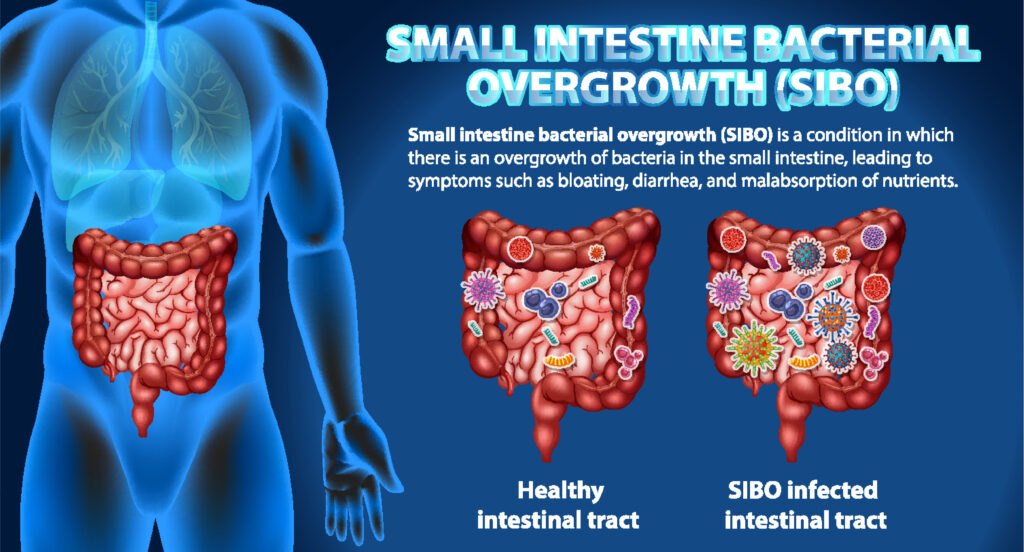What Causes SIBO And Why Typical Treatments Don’t Offer Relief
Let’s take a look at what causes SIBO and discuss natural treatment options for this condition. SIBO, also known as Small Intestinal Bacterial Overgrowth, is a digestive disorder that occurs when there is an excessive amount of bacteria in the small intestine. This leads to digestive issues such as abdominal pain, bloating, gas, diarrhea, and constipation.
SIBO is often associated with other conditions, such as irritable bowel syndrome (IBS) and inflammatory bowel disease (IBD). Allopathic treatment for SIBO focuses on surgery if possible as well as antibiotics and dietary changes. Unfortunately, using antibiotics to treat SIBO is generally not effective because these bacteria quickly return after antibiotics are discontinued. At this point, more antibiotics are administered and the cycle continues.1

How To Test For SIBO – Breath Test
The most common way to test for SIBO is through a breath test. This test requires a series of breath samples, which are then analyzed to determine if the levels of methane and hydrogen gas are elevated, indicating SIBO. Other tests may also be used to diagnose SIBO, such as a glucose breath test and a lactulose breath test. The problem with these tests is they are expensive and not always accurate.2
How To Test For SIBO – Eating FODMAP Foods
There are several quick and inexpensive methods for testing for SIBO. One method is to consume FODMAP foods for testing purposes. FODMAP stands for Fermentable Oligo-, Di-, Mono-saccharides, And Polyols. These foods can cause bloating, gas, abdominal pain, constipation, or diarrhea in people with SIBO.
Some examples of high-FODMAP foods include fruits like apples, cherries, and watermelon; vegetables such as onions, garlic, and mushrooms; dairy products like milk and yogurt; grains including wheat and rye; and nuts like cashews and pecans.3
My favorite SIBO testing methods are the garlic and onion test as well as the pecans and cashew test. To perform this test, all you need to do is eat garlic and onions (either cooked or raw) or pecans and cashews. After eating garlic and onions or pecans and cashews, an increase in bloating and gas indicates that you likely have SIBO.
How To Test For SIBO – Consuming Inulin
Inulin, a high FODMAP oligosaccharide, is a type of carbohydrate that is found in many plant-based foods such as onions, garlic, and chicory root. It is commonly used as a prebiotic, which means it feeds the beneficial bacteria in our gut. However, for people who have SIBO, consuming inulin can actually be used as a diagnostic tool because excessive bacteria in their small intestine will feed on it and produce gas as a byproduct.4
What Causes SIBO?
SIBO is caused by a multitude of factors like excessive antibiotic use, low stomach acid levels, slow motility of the digestive system, and previous digestive infections.
What Causes SIBO – Antibiotics
Antibiotics are one of the most common causes of SIBO. Antibiotics disrupt the balance of bacteria in the gut, making it easier for bad bacteria to outnumber and overpopulate good ones. This disruption creates an environment where SIBO-causing bacteria thrive and cause symptoms. People who have had multiple courses of antibiotics, or individuals taking long-term antibiotics for chronic conditions, such as acne, are at an increased risk of developing SIBO.5

What Causes SIBO – Low Stomach Acid Levels
Stomach acid plays a crucial role in our digestive system by breaking down food and killing harmful bacteria that enter our body through food or water. However, due to certain lifestyle habits or underlying health conditions, the production of stomach acid can reduce significantly.
When there is a decrease in stomach acid levels, it becomes difficult for the body to break down and digest food properly. This leads to undigested food particles reaching the small intestine, providing a food source for bacteria to thrive and grow.
Moreover, low stomach acid also disrupts the natural balance of bacteria in the digestive system. The acidic environment of the stomach helps keep harmful bacteria in check, but when this acidity is reduced, these bacteria can spread to other parts of the digestive tract, including the small intestine.6
What Causes Low Stomach Acid Levels
There are various factors that can contribute to low stomach acid levels in the body. One common cause is an infection with H. pylori bacteria, which can lead to inflammation and damage of the stomach lining, ultimately reducing the production of stomach acid.
Another potential cause of low stomach acid is the use of certain medications, particularly proton pump inhibitors (PPIs). These drugs are often prescribed to treat conditions such as acid reflux, ulcers, and gastritis by reducing the amount of acid produced in the stomach. However, long-term use of PPIs can actually lead to hypochlorhydria (low stomach acid) and other digestive issues.
Additionally, gastric bypass surgery has been linked to low stomach acid levels due to the reduced production of stomach acid after the procedure. This can lead to a higher risk of nutrient deficiencies and other digestive problems.7
What Causes SIBO – Slow Motility Of The Digestive System
One of the main factors that can contribute to SIBO is slow motility of the digestive system. Slow motility refers to a decreased movement or contraction of the muscles in the digestive tract, particularly in the small intestine. When the movement of food through the small intestine is slowed down, it allows more time for bacteria in the gut to multiply and grow, leading to an overgrowth in the small intestine.8
What Causes SIBO – Previous Intestinal Infections
Intestinal infections are common and can be caused by various bacteria, viruses, or parasites. These infections disrupt the balance of bacteria in the gut and lead to an overgrowth of certain types of bacteria. This overgrowth can then progress to SIBO.9
What Causes SIBO – Celiac Disease
Celiac disease is a condition that affects the small intestine and is caused by an autoimmune reaction to gluten, a protein found in wheat, barley, and rye. When someone with celiac disease consumes gluten, their immune system attacks the lining of the small intestine, damaging it and making it difficult for nutrients to be absorbed properly. This damage can also lead to a disruption in the normal balance of bacteria in the gut, which contributes to the development of SIBO.
In addition to this direct effect on gut health, celiac disease can also indirectly contribute to the development of SIBO. People with celiac disease often have a weakened immune system and increased intestinal permeability known as “leaky gut”, which make them more susceptible to developing SIBO.
Moreover, celiac disease is often accompanied by other digestive issues such as constipation, diarrhea, and acid reflux, all of which can increase the risk of SIBO. These symptoms lead to a reduction in gut motility and changes in digestive enzyme production, both of which can create an environment ripe for SIBO development.10
Read more about Celiac disease.

What Causes SIBO – Crohn’s Disease
Crohn’s disease is a chronic inflammatory bowel disease that affects the digestive tract. It can cause inflammation and damage in any part of the gastrointestinal (GI) tract, from the mouth to the anus. In Crohn’s disease, the immune system mistakenly attacks harmless bacteria in the digestive tract, causing inflammation and damage to the GI tract. This often leads to an imbalance of bacteria in the small intestine, which can contribute to SIBO.11
People with Crohn’s disease have slow intestinal motility due to inflammation and scarring of the intestinal walls. This can slow down or even stop the movement of food through the digestive tract, creating an environment where bacteria overgrow and lead to SIBO.12
Read more about Crohn’s Disease.
SIBO Treatment Options – Herbal Therapy
Oregano oil is a powerful natural antibiotic that has been found to be effective in treating SIBO. It contains compounds such as carvacrol and thymol, which have antimicrobial properties and can help reduce bacterial overgrowth in the gut.
Berberine is a compound extracted from various plants and has been used for centuries in traditional medicine. Studies have shown that berberine is effective in treating SIBO by inhibiting the growth of harmful bacteria in the small intestine.13
SIBO Treatment Options – Probiotic Yogurt
Probiotics are live bacteria and yeast that are beneficial for our digestive system. They help balance the levels of good and bad bacteria in the gut, which is essential for maintaining a healthy digestive system. Probiotics are helpful in treating SIBO by reducing the overgrowth of harmful bacteria in the small intestine.14
Lactobacillus is a type of probiotic commonly found in yogurt and fermented foods and has been shown to reduce bloating and improve digestive function in individuals with SIBO. Bifidobacterium is another probiotic that is known for its ability to improve gut health and may help reduce the number of harmful bacteria in the small intestine. Saccharomyces boulardii is a yeast probiotic that has been found to be effective in reducing symptoms of SIBO and also has anti-inflammatory properties.15
What Causes SIBO And Why Typical Treatments Don’t Offer Relief
Exactly what causes SIBO can be complex which is why getting to the root cause of the issue and correcting it is paramount. Additionally, using herbal therapy and probiotic yogurt are natural ways to restore equilibrium throughout the entire digestive tract.
Read more about what causes digestive issues.
References
1 Small intestinal bacterial overgrowth (SIBO) – Diagnosis & treatment – Mayo Clinic. (2022, January 6). Mayo Clinic. https://www.mayoclinic.org/diseases-conditions/small-intestinal-bacterial-overgrowth/diagnosis-treatment/drc-20370172
2 Losurdo G, Leandro G, Ierardi E, Perri F, Barone M, Principi M, Leo AD. Breath Tests for the Non-invasive Diagnosis of Small Intestinal Bacterial Overgrowth: A Systematic Review With Meta-analysis. J Neurogastroenterol Motil. 2020 Jan 30;26(1):16-28. doi: 10.5056/jnm19113. PMID: 31743632; PMCID: PMC6955189.
3 Achufusi TGO, Sharma A, Zamora EA, Manocha D. Small Intestinal Bacterial Overgrowth: Comprehensive Review of Diagnosis, Prevention, and Treatment Methods. Cureus. 2020 Jun 27;12(6):e8860. doi: 10.7759/cureus.8860. PMID: 32754400; PMCID: PMC7386065.
4 Wielgosz-Grochowska JP, Domanski N, Drywień ME. Efficacy of an Irritable Bowel Syndrome Diet in the Treatment of Small Intestinal Bacterial Overgrowth: A Narrative Review. Nutrients. 2022 Aug 17;14(16):3382. doi: 10.3390/nu14163382. PMID: 36014888; PMCID: PMC9412469.
5 Dukowicz AC, Lacy BE, Levine GM. Small intestinal bacterial overgrowth: a comprehensive review. Gastroenterol Hepatol (N Y). 2007 Feb;3(2):112-22. PMID: 21960820; PMCID: PMC3099351.
6 Bures J, Cyrany J, Kohoutova D, Förstl M, Rejchrt S, Kvetina J, Vorisek V, Kopacova M. Small intestinal bacterial overgrowth syndrome. World J Gastroenterol. 2010 Jun 28;16(24):2978-90. doi: 10.3748/wjg.v16.i24.2978. PMID: 20572300; PMCID: PMC2890937.
7 Fatima R, Aziz M. Achlorhydria. [Updated 2023 Aug 14]. In: StatPearls [Internet]. Treasure Island (FL): StatPearls Publishing; 2024 Jan-. Available from: https://www.ncbi.nlm.nih.gov/books/NBK507793/
8 Losurdo G, Salvatore D’Abramo F, Indellicati G, Lillo C, Ierardi E, Di Leo A. The Influence of Small Intestinal Bacterial Overgrowth in Digestive and Extra-Intestinal Disorders. Int J Mol Sci. 2020 May 16;21(10):3531. doi: 10.3390/ijms21103531. PMID: 32429454; PMCID: PMC7279035.
9 Efremova I, Maslennikov R, Poluektova E, Vasilieva E, Zharikov Y, Suslov A, Letyagina Y, Kozlov E, Levshina A, Ivashkin V. Epidemiology of small intestinal bacterial overgrowth. World J Gastroenterol. 2023 Jun 14;29(22):3400-3421. doi: 10.3748/wjg.v29.i22.3400. PMID: 37389240; PMCID: PMC10303511.
10 Shah A, Thite P, Hansen T, Kendall BJ, Sanders DS, Morrison M, Jones MP, Holtmann G. Links between celiac disease and small intestinal bacterial overgrowth: A systematic review and meta-analysis. J Gastroenterol Hepatol. 2022 Oct;37(10):1844-1852. doi: 10.1111/jgh.15920. Epub 2022 Jul 1. PMID: 35734803; PMCID: PMC9795979.
11 Wei J, Feng J, Chen L, Yang Z, Tao H, Li L, Xuan J, Wang F. Small intestinal bacterial overgrowth is associated with clinical relapse in patients with quiescent Crohn’s disease: a retrospective cohort study. Ann Transl Med. 2022 Jul;10(14):784. doi: 10.21037/atm-22-3335. PMID: 35965806; PMCID: PMC9372671.
12 Barros LL, Farias AQ, Rezaie A. Gastrointestinal motility and absorptive disorders in patients with inflammatory bowel diseases: Prevalence, diagnosis and treatment. World J Gastroenterol. 2019 Aug 21;25(31):4414-4426. doi: 10.3748/wjg.v25.i31.4414. PMID: 31496621; PMCID: PMC6710178.
13 Chedid V, Dhalla S, Clarke JO, Roland BC, Dunbar KB, Koh J, Justino E, Tomakin E, Mullin GE. Herbal therapy is equivalent to rifaximin for the treatment of small intestinal bacterial overgrowth. Glob Adv Health Med. 2014 May;3(3):16-24. doi: 10.7453/gahmj.2014.019. PMID: 24891990; PMCID: PMC4030608.
14 Zhong C, Qu C, Wang B, Liang S, Zeng B. Probiotics for Preventing and Treating Small Intestinal Bacterial Overgrowth: A Meta-Analysis and Systematic Review of Current Evidence. J Clin Gastroenterol. 2017 Apr;51(4):300-311. doi: 10.1097/MCG.0000000000000814. PMID: 28267052.
15 Leventogiannis K, Gkolfakis P, Spithakis G, Tsatali A, Pistiki A, Sioulas A, Giamarellos-Bourboulis EJ, Triantafyllou K. Effect of a Preparation of Four Probiotics on Symptoms of Patients with Irritable Bowel Syndrome: Association with Intestinal Bacterial Overgrowth. Probiotics Antimicrob Proteins. 2019 Jun;11(2):627-634. doi: 10.1007/s12602-018-9401-3. Erratum in: Probiotics Antimicrob Proteins. 2018 Mar 28;: PMID: 29508268; PMCID: PMC6541575.




